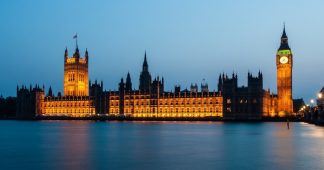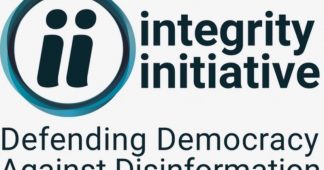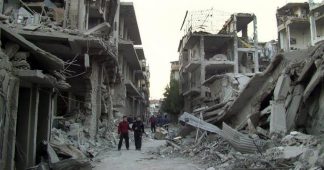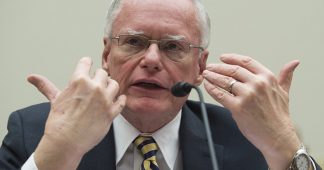Documents obtained by MEE reveal how British contractors recruited Syrian citizen journalists – often without their knowledge – to promote ‘moderate opposition’
Ian Cobain, Alice Ross
19 February 2020
The British government covertly established a network of citizen journalists across Syria during the early years of the country’s civil war in an attempt to shape perceptions of the conflict, frequently recruiting people who were unaware that they were being directed from London.
A number of leaked documents seen by Middle East Eye show how the propaganda initiative began in 2012 and gathered pace the following year, shortly after the UK parliament refused to authorise British military action in Syria.
Drawing upon British, American and Canadian funding, UK government contractors set up offices in Istanbul and Amman, where they hired members of the Syrian diaspora, who in turn recruited citizen journalists inside Syria.
These journalists, many of them young, were commissioned to produce TV footage, radio programmes, social media, posters, magazines and even children’s comics.
While many Syrians turned spontaneously to media activism from the start of the war, the documents describe the way in which the British government sought to guide some of their output, seeing citizen journalism as a way of covertly influencing Syrian audiences.
The papers also make clear that those people who were recruited were often unaware that they were part of a British propaganda initiative.
Some of those who were recruited have defended their involvement, however, saying that they were reliant on western support in their efforts to counter pro-government reporting in Syrian state media, and in Iranian and Russian-backed media.
At a time when the last opposition-held enclave in
Some Syrian journalists complained that western support for their work was decreasing even as it was most needed, after Russia’s entry into the war in 2015 tipped the balance in favour of President Bashar al-Assad.
The documents were drawn up as blueprints for the initiative by an anthropologist working in counter-terrorism at the foreign office in London. They were issued in late 2014 to a small number of communications companies that were invited to bid for three contracts to deliver the work.
One says: “The objective of the project is contribute [sic] towards positive attitudinal and behavioural change.”
This was further defined as: “Reinforcement of popular rejection of the Assad regime and extremist alternatives; promotion of the moderate values of the revolution; promotion of Syrian national identity.”
The documents show that the over-arching aim of the citizen journalism project – and a series of interlinked British propaganda initiatives – was to promote the UK’s strategic interests in Syria and the Middle East.
These are defined in the leaked papers as “a more stable and democratic Syria that better meets the needs and aspirations of its people”, support for a political solution to the conflict, the alleviation of humanitarian suffering, and enhanced UK security.
As well as developing grassroots journalism aligned with British government values, the UK and other western governments were at the same time attempting to build civil society in areas controlled by some of Assad’s opponents, financing and training police forces and civil defence teams.
The anthropologist’s blueprint makes clear that this was being done not just to help maintain law and order and provide humanitarian assistance, but “to build confidence in a future Syria free from extremist rule”.
However, the documents acknowledge the risks to the young journalists who had unwittingly been co-opted by the British government.
“Media coverage of the project will be distinctly unwelcome due to the risks to Syrian employees and to project effectiveness that it would generate,” says one.
“The implementer is not permitted to speak publicly (to the media or at academic conferences) about their work without the explicit permission of HMG [Her Majesty’s Government]. This will be enforced by a Non Disclosure Agreement.”
A number of young Syrian citizen journalists were detained and murdered by the Islamic State (IS) group after it began capturing territory in the country in 2015.
The group frequently denounced its victims as western “spies”, and some Syrian citizen journalists were pursued across the border to Turkey and killed.
Whilst many of the victims were not thought to be involved in British-sponsored projects, MEE is aware of two who were.
Three-pronged campaign
The British government’s citizen journalism project was part of a three-pronged propaganda initiative that was developed in London and was, according to the documents, intended to “have a synergistic effect”.
The first strand, named Syrian Identity, sought to “unite Syrians through positive affirmation of common cultures and practices and to restore trust between neighbours, while illustrating Syrians’ strength in numbers,” according to the blueprint.
The documents explain that the second strand, called Free Syria, “seeks to build confidence in a future Syria free from extremist rule”.
t “amplifies the work of the ‘free’ police, civil defence teams and wider public service provision and broader developments in civil society and seeks to unite the moderate opposition (civil and armed) to work for a common future”.
The third, known as Undermine, “seeks to degrade the effectiveness of VE [violent extremist] networks in Syria by undermining the credibility of VE narratives and actors and isolating VE organisations from the populace.”
The document goes on, using a different acronym for IS: “ISIL is an explicit and named focus, Al Nusra Front (due to its current popularity within Syria) is addressed indirectly through its behaviour.
“The purpose of the project to directly ‘Undermine’ (degrading the effectiveness of) VE networks in Syria through the delivery of media product, the emboldening and empowering of moderate voices, and supporting community coalescence around a vision of a tolerant, pluralist Syria. Ultimately, active Syrian rejection of VE is the requirement.”
The documents add that the research underpinning the initiative “will need to be able to draw upon open source material, jihadist discourse and, in particular, a network of assets inside Syria”.
Military intelligence officers
Individuals familiar with the project say that around nine companies were invited to bid for the contracts. They included a number of firms established by former British diplomats, intelligence officers and army officers.
Although the contracts were awarded by the UK’s foreign office, they were managed by the country’s Ministry of Defence, and sometimes by military intelligence officers.
These companies set up offices in Amman, Istanbul and, for a period, at Reyhanli in southeast Turkey. From here they would employ Syrians who would in turn recruit citizen journalists inside Syria, who were under the impression that they were working for the media offices of Syrian opposition groups.
“It was a shady, shady business,” says one person involved in the work, adding that frequently the individual journalist would believe they were working for an opposition group, and have no idea that a British communications company was running their media office, under contract to the UK government.
A second person involved with the initiative added that if you hired Syrians “to pump out propaganda, inside Syria and outside”, attributing their work in any way to the British government would have undermined its effectiveness.
Many of these citizen journalists would be using equipment that they believed was being supplied by opposition groups but which had in fact been bought using funds supplied by the UK government as part of the contract.
Some would be paid a retainer of between $250-$500 a month, while others were paid for individual pieces of media – around $50 for each picture or $200 for a short piece of video.
These would then be distributed to Arabic language media organisations, through what purported to be the press offices of Syrian opposition groups.
Favoured video clips might be film of fighters from the moderate opposition handing out food, or using sophisticated weaponry to good effect.
“Then that would go to Sky News Arabia, BBC Arabic, Al Jazeera, Al Arabiya, those sort of outlets,” said one person involved.
Whenever British government officials wished to discuss the work, meetings would be held away from the newly established offices, to avoid contact with the locally hired Syrians.
British staff running the offices would also be expected to prepare reports on their meetings with Syrians, which would be passed back to the foreign office.
Opposition social media accounts
Meanwhile, other leaked documents seen by MEE show that the British government had awarded contracts to communications companies, which selected and trained opposition spokespeople, ran press offices that operated 24 hours a day, and developed opposition social media accounts.
British staff running these offices were told that their Syrian employees were permitted to talk to British journalists – as spokespeople for the Syrian opposition – but only after receiving clearance from officials at the British consulate in Istanbul.
One of the responsibilities of the press offices set up covertly by the British government under the terms of these contracts was to “maintain an effective network of correspondents/stringers inside Syria to report on MAO [moderate armed opposition] activity”.
In this way, the British government was able to exert behind-the-scenes influence over conversations that the UK media was having with individuals who presented themselves as Syrian opposition representatives.
People involved with the operation say that some prominent British journalists visiting Istanbul would be introduced to Syrians acting as opposition spokespeople, who had been prepared for the encounter by British handlers.
They say they would brief the Syrians before the meeting, and avoid any face-to-face contact with the visiting journalists themselves.
The propaganda initiative was primarily aimed at Syrians, living both inside and outside Syria. The blueprint explains that “radicalised UK citizens are not an explicit focus (target audience) for this work,” adding: “Those efforts are the responsibility of another government department.”
It adds: “Nevertheless, it is accepted that some C-VE [countering violent extremist] material may reach the UK information space.”
Furthermore, UK audiences could on occasion be “a specified target” of some media being produced as part of the initiative, with the permission of British officials in Istanbul.
The different strands of the propaganda programme were evaluated by a scientist from the UK’s Ministry of Defence, looking for evidence of “behavioural and attitudinal change”.
The companies bidding for the contracts were told: “Behavioural changes linked… to campaign activity will be especially highly valued.”
During 2015, Free Syria, Syrian Identity and Undermine were funded in both British pounds and Canadian dollars, with the equivalent of around £410,000 ($540,000) being spent each month.
Some Syrians who became involved in the programme say that the money they received was the only means by which they could hope to support their families. “I have a wife and family,” said one. “We need support in order to be able to live. Is there an independent media outlet in this world?”
The British government appears to have regarded its propaganda initiative as being in part a way to maintain a presence in Syria until it was able to become militarily engaged, with the blueprint saying that it should have “the capability to expand back into the strategic as and when the opportunity arises, to help build an effective opposition political-military interface”.
Around the same time that the initiative was being developed, the British government “loaned” a number of its pilots to the US, French and Canadian air forces, enabling them to take part in combat missions against Syrian targets, despite the county’s parliament having voted against such action.
British government enthusiasm for much of the work appears to have begun to wane as it became increasingly clear that the Assad government and its Russian and Iranian allies were winning the civil war, and funding for contracts began to dry up.
Early in 2019, the Free Syrian Police, a British-backed organisation, finally ceased operations following a militant takeover of Idlib province, much to the dismay of civilians and civil society activists.
The Turkish government is also said to have become less tolerant of the propaganda initiatives being co-ordinated from its territory.
One British contractor is understood to have been expelled after the Turkish authorities discovered she had entered the country on a tourist visa.
Published at https://www.middleeasteye.net/news/revealed-british-government-covert-propaganda-campaign-syria














